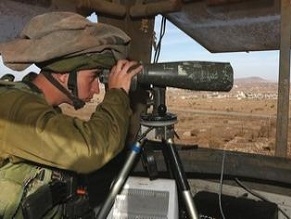|
World Jewish News

A SOLDIER from the Nahal Reconnaissance Company looks out at the border with Syria. Photo: Marc Israel Sellem/The Jerusalem Post
|
IDF Northern Command maintains high alert after Hezbollah threats
27.02.2014, Israel and the World The IDF Northern Command remained on a heightened state of alert on Thursday, a day after Hezbollah threatened retaliation for an alleged Israeli air strike on a site in eastern Lebanon in which illicit weapons were being kept by the terrorist organization.
The state of alert can be seen as a natural response to Hezbollah's threats, but is not an indication of an imminent flare up along the border.
On Wednesday evening, the IDF ordered farmers away from fields near the Lebanese border.
In a statement, Hezbollah said it would 'choose the time and place and the proper way to respond.' Farmers in Metulla, a small Israeli community that abuts the Lebanese border said Israel's military had warned them to keep out of their fields due to intelligence warnings.
"Yesterday we received notice from the army not to approach our orchards along the border area, and not to work them," said farmer Yossi Levit. "Our army, at the moment, because of all sorts of notices, won't allow us to get any closer, intelligence notices, and we unfortunately have to follow those," he said.
The strike, which Israel has not confirmed, hit the Lebanese-Syrian border near the Bekaa Valley village of Janta, Hezbollah said. It denied reports that the strike targeted artillery or rocket bases and said there were no casualties.
Lebanese security sources have said they believed that any attack took place on Syrian soil, but Hezbollah's reference to Lebanese sovereignty suggested it took place on the Lebanese side of the ill-defined frontier.
According to foreign reports, Israeli planes have struck areas on the Syrian side of the border five to six times in the past year but, if confirmed, an air strike on Lebanese soil would be the first since the Syrian revolt began in 2011.
The eastern Lebanon-Syrian border area is frequently used by smugglers and Lebanese security sources say the target of Israeli strikes in Syria may have been trucks of weapons destined for Hezbollah.
The Lebanese army reported that four Israeli planes had flown across north Lebanon on Monday night towards the Bekaa Valley before heading southwest towards the Mediterranean near Lebanon's southern border with Israel.
Prime Minister Benjamin Netanyahu did not claim or deny the strike but said on Tuesday Israel would do everything required to safeguard the security of its citizens.
Last year, Defense Minister Moshe Ya'alon spelled out Israel's red lines regarding developments to its north. "We don't get involved in the internal [Syrian] war, but we place clear red lines: Not to allow the transfer of balance-altering weapons to hostile elements, with an emphasis on Hezbollah, not to allow the transfer of chemical weapons and not to allow harm to our sovereignty on the Golan Heights," he said.
By YAAKOV LAPPIN
JPost.com
|
|
